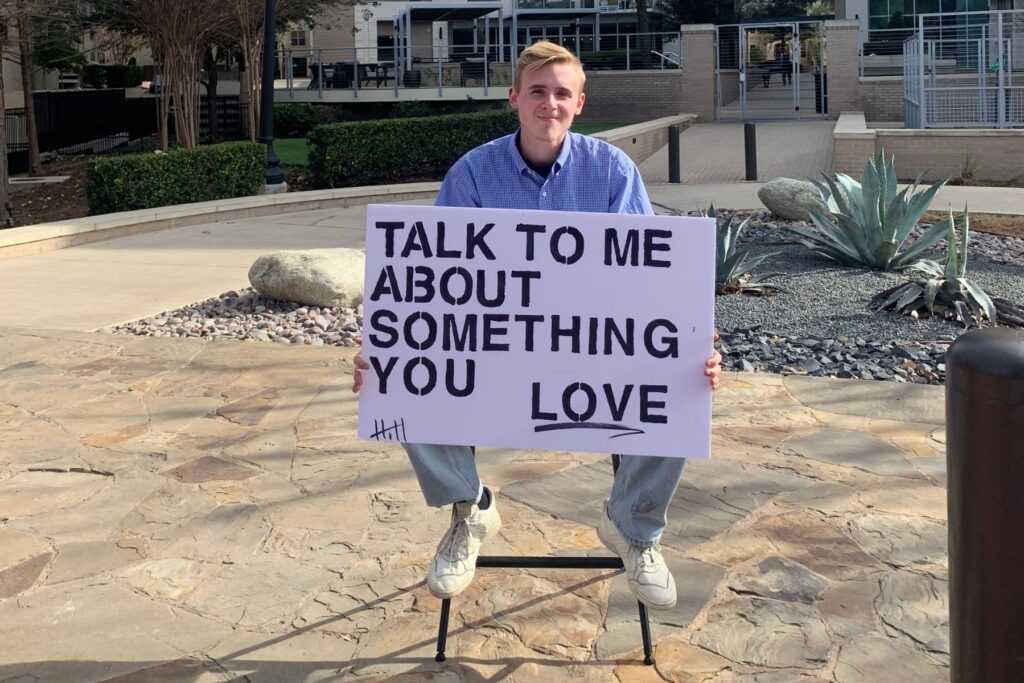It was Sunday on the Katy Trail, 3 p.m., the kind of blue-sky afternoon when all the men look good and the dogs look happy. I was walking with a friend, rounding the bend just beyond the Katy Trail Ice House, when I saw the sign: Talk to me about something you love.
He was young. Short blonde hair, the whispers of a goatee. Was this some TikTok scheme? Another sad attempt to go viral? But there were no cameras, just the nice-looking kid in a blue-and-white-checkered button-down sitting on a stool and holding a cardboard sign hand-painted in capital letters that looked stenciled. The last word, LOVE, was underlined.
“I gotta check this one out,” I told my friend, who nodded and went off to stretch. We’ve been friends for 10 years and she can recognize when I’ve got a hook in me.
“He’s good,” another woman assured me, as she steadied her phone with her long nails to take a picture of him next to her friend, both of them smiling. That duo peeled off, and I stepped in.
“What’s your name?” I asked as we shook hands.
“Hogan,” he said, squinting in the sunshine. “Do you want to guess who I’m named after?”
“Hulk Hogan,” I said, but he shook his head. He had two Japanese letters tattooed on the side of his neck, which he rubbed with his palm as my mind searched the possibilities. Hogan’s Heroes? Hoagie sandwiches? It felt too early in our friendship to fall so flat, but Hogan tried to save me.
“The golfer,” he said, but I had nothing. “Ben Hogan.” I made an ohhhhhh sound, even though I’d never heard of Ben Hogan. Born in Stephenville, son of a blacksmith, dropped out of high school and later won the Triple Crown in 1954, died in Fort Worth at the age of 84. Nope, never heard of him.
“What’s the most moving thing you’ve heard today?” I asked him.
He scrunched his face. “Well, this guy ran past me on the trail, but then he doubled back and pointed at my sign and said he wanted to get back together with his husband. So that was very moving.”
I thought mine had been a clever question, but it turns out to be a very common one. Hogan finds it hard to answer; so many things are moving, and how do you rank them? Some people just pass and shout out things about spouses and their dogs.
But even those can be charming. One woman leaned into his ear and whispered, “Topo Chico!” That delighted him.
Then there are those brief interactions that prove surprisingly heavy. Later he would tell me about a grandfather who jogged past him that afternoon with his grandkids, both under the age of two, and he casually dropped the fact that he’d just gotten over stage four pancreatic cancer. That stunned Hogan, whose grandpa died of pancreatic cancer.
“He basically explained that every moment is good now,” Hogan told me. “And then his last words to me were that I should chase pretty women.” Hogan thought that was pretty good advice.
If I held a sign up on the Katy Trail (something I would never do), it might read: Tell me your story. So here’s Hogan’s.
Twenty years old, an only child, his father struggled with an addiction to alcohol until he was about 11. Hogan grew up in Commerce City, Colorado. “The middle of nowhere,” he says. But he went to high school just south of Denver in a town called Littleton at Arapahoe High School, a college prep school with about 2,100 students.
Interesting story about Arapahoe: Hogan says within his first two weeks, the school had two suicides, and the same thing happened the next year. The entire region was experiencing a rise in suicides that left people shaken. Hogan used to counsel kids over suicidal urges, because he’d experienced those, too.
From 12 to 17, he struggled with a painful awareness that his life wasn’t like the others, and it depressed him in a way that could feel hopeless. A lot of the kids in Arapahoe wouldn’t get psychiatric help, he explained, because it might look bad for their parents, but the status quo was hurting people, and Hogan wanted to help.
He thought about going into counseling, psychiatry, psychology, something like that, but instead he found a career working with his hands. He’s been a diesel mechanic since he could legally drive. On his LinkedIn page, he writes, “I can’t even remember what my life was like before I found my purpose. This passion.”
He started as a lube technician at an Acura dealership and was later hired at an engine builder called Cummins Inc. His job was to assist and overlook technicians, and he noticed they had a lot to say.
“They’re working alone and don’t have time to talk to anyone and some don’t have significant others, so when they go home, they don’t talk to anyone,” he told me later. “That was the first time I had to listen.”
Hogan was 17. He was in that stage where most of his sentences started with “I,” and his own self-centered nature bugged him. “Nobody wants to be around a person like that,” he told me. “You gotta listen to people, and you might enjoy it more than talking.”
He moved to Dallas in August 2020. He got a scholarship to attend a technical school called UTI. “Not the infection,” he says. (It’s short for Universal Technical Institute.) Around that time, he saw a viral video where a guy sat at a table and put out his opinion with a sign that read, “Prove me wrong.” He thought that was cool.
One day, Hogan set up an advice table on the TCU campus, which he’d chosen because it was conservative and religious. He thought people might be more open to him. It was sleeting that day. “No one came up, and it was awful,” he told me. But he went back anyway, and the weather was better, and the people arrived. He got questions about what major the kids should choose and what to do about an eating disorder. One woman asked him how to get vomit out of a carpet. He did what he could.
The practice of giving advice to people in public spaces is nothing new. All across social media, you can find strangers with signs offering words of wisdom and compassion to the lost and wayward masses. It was kind of like Tarot, or Tinder for that matter, but much less expensive (and without the sex). Here in Dallas, two older men named Roderick MacElwain and Neal Caldwell offered free advice at White Rock Lake for years, and they were surprisingly good. Sage, gentle, deeply observant. Hogan had never heard of them, but he was excited other people had come to the same realization he had. That listening felt good.
But he didn’t want to give advice anymore. That’s why he came up with the prompt: Tell me about something you love. He set up his stool near his apartment at the Gables, so he could have easy access to a bathroom if he needed one, and he wasn’t sure what to expect. On the day I met him, he’d started at 2 p.m., and he reckons he spoke to about 30 people.
At one point, he was talking to an entire family, and then another group joined them, and it was like a family dinner. “It was fantastic,” he said, in a voice memo he sent later that evening. “I talked to another woman about holistic therapy and how much she likes that.”
He saw a friend of his uncle’s, which was special. He left around 6:30 p.m., when the sun went down. He never goes with a plan, exactly. “I’ll ask God, ‘is there anyone else you want me to speak to today?’ And there’s always one more worth staying for — and then I go.”
He feels better afterward. That’s the part people don’t necessarily understand. All these people. All these connections. All this pain and joy and hope and despair. He isn’t always sure what to do with these interactions. “It’s like, which drawer are we going to put it in? How do we hold on to this?”
I chit-chatted with him on the trail that afternoon for about 10 minutes, and I really had to go, but Hogan and I did have one more matter of business.
“You didn’t tell me what you love,” he said. Oh, right. My turn.
I told him about a man who may or may not love me, who may or may not be coming back. It’s a twisty tale, the kind of lovelorn saga I have (in previous periods of grief) told a fortune teller, or a therapist, or a stranger at a bar. Hogan rubbed his chin.
“I like that story because it has so much passion,” he said. “And what strikes me is that even though things are complicated, the level of honesty in your conversation with him is really admirable.”
I would agree. I stared into the trees, which were bare and crooked. Nobody can ever really tell you what’s going to happen; they can only listen and walk alongside you on the path.
“Well, he’s either going to turn a corner or not, it’s hard to say,” Hogan told me. I would agree with that, too.
Listening is a lost art. We live in a world of talking and arguing and slap-downs on social media and me-me-me. But to listen to someone’s story is a gift for both people. I wanted to stay and keep talking to Hogan, but sometimes the best interactions are fleeting.
“Someone’s waiting,” my friend said gently, and for a moment I thought she meant herself, but she was pointing to a young athletic man in jogging shorts, staring at his phone patiently.
“You’ve got a line!” I told Hogan, and he smiled. He had an Archie Comics squeaky-cleanness, but he was so deep. I had a weird feeling I wanted to know him better, but he had listening to do.
A lot of people needed to tell him about something they love.
Author







